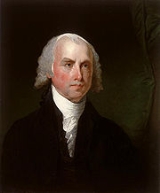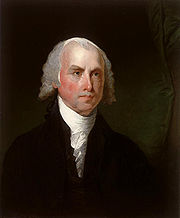
Federalist No. 45
Encyclopedia

James Madison
James Madison, Jr. was an American statesman and political theorist. He was the fourth President of the United States and is hailed as the “Father of the Constitution” for being the primary author of the United States Constitution and at first an opponent of, and then a key author of the United...
. It is the forty-fifth of the Federalist Papers
Federalist Papers
The Federalist Papers are a series of 85 articles or essays promoting the ratification of the United States Constitution. Seventy-seven of the essays were published serially in The Independent Journal and The New York Packet between October 1787 and August 1788...
, and was published on January 26, 1788 under the pseudonym
Pseudonym
A pseudonym is a name that a person assumes for a particular purpose and that differs from his or her original orthonym...
Publius. Madison argues that the strength of the federal government under the proposed United States Constitution
United States Constitution
The Constitution of the United States is the supreme law of the United States of America. It is the framework for the organization of the United States government and for the relationship of the federal government with the states, citizens, and all people within the United States.The first three...
does not pose a danger to the individual states, a major concern of the Anti-Federalists.
Invigoration of original powers
Madison writes that the new Constitution does not in principle enlarge the powers of the Federal government, but merely renders that government more effective in carrying out its existing duties:Central to administering these powers, Madison argues, is the power to tax. Further, he states that this power has precedent in the Articles of Confederation
Articles of Confederation
The Articles of Confederation, formally the Articles of Confederation and Perpetual Union, was an agreement among the 13 founding states that legally established the United States of America as a confederation of sovereign states and served as its first constitution...
:
Madison also argues that the National Government is indeed subservient to the State Governments, yet the Federalist structure serves as a method of disguising this truth. Madison argues that the National Government must rely on the states to pass amendments, and the states themselves can propose and pass amendments at their choosing.
Federal powers are few and defined
The idea that the reach of the federal governmentFederal government of the United States
The federal government of the United States is the national government of the constitutional republic of fifty states that is the United States of America. The federal government comprises three distinct branches of government: a legislative, an executive and a judiciary. These branches and...
would be restricted to a few enumerated powers
Enumerated powers
The enumerated powers are a list of items found in Article I, section 8 of the US Constitution that set forth the authoritative capacity of the United States Congress. In summary, Congress may exercise the powers that the Constitution grants it, subject to explicit restrictions in the Bill of...
is articulated by Madison in Federalist No. 45:
Alexander Hamilton
Alexander Hamilton
Alexander Hamilton was a Founding Father, soldier, economist, political philosopher, one of America's first constitutional lawyers and the first United States Secretary of the Treasury...
relied on the same view when later arguing, in Federalist No. 84
Federalist No. 84
Federalist No. 84 , an essay entitled "Certain General and Miscellaneous Objections to the Constitution Considered and Answered," is one of the Federalist Papers by Alexander Hamilton, published under the pseudonym Publius on July 16, July 26, and August 9, 1788.Federalist No...
, against inclusion of a Bill of Rights
United States Bill of Rights
The Bill of Rights is the collective name for the first ten amendments to the United States Constitution. These limitations serve to protect the natural rights of liberty and property. They guarantee a number of personal freedoms, limit the government's power in judicial and other proceedings, and...
in the Constitution
United States Constitution
The Constitution of the United States is the supreme law of the United States of America. It is the framework for the organization of the United States government and for the relationship of the federal government with the states, citizens, and all people within the United States.The first three...
. Hamilton was wary of articulating specific restrictions on federal power, for he felt it was clear that the default position of the federal government was an absence of power, and any specific power existed only by grant from the Constitution:
These observations foreshadow passage of the Tenth Amendment to the United States Constitution
Tenth Amendment to the United States Constitution
The Tenth Amendment to the United States Constitution, which is part of the Bill of Rights, was ratified on December 15, 1791...
, ratified three years later, which codified the doctrine of enumerated powers:
The principle expressed in Federalist No. 45 was later echoed by Supreme Court
Supreme Court of the United States
The Supreme Court of the United States is the highest court in the United States. It has ultimate appellate jurisdiction over all state and federal courts, and original jurisdiction over a small range of cases...
Justice Joseph Story
Joseph Story
Joseph Story was an American lawyer and jurist who served on the Supreme Court of the United States from 1811 to 1845. He is most remembered today for his opinions in Martin v. Hunter's Lessee and The Amistad, along with his magisterial Commentaries on the Constitution of the United States, first...
:
Perhaps vindicating Hamilton's opinion that, at least in the case of the Tenth Amendment (an original component of the Bill of Rights he rallied against), articulating restrictions of federal power were unnecessary, the Supreme Court found in United States v. Sprague
United States v. Sprague
United States v. Sprague, was a United States Supreme Court case that dealt with the Fifth Article of the US Constitution. The defendants had been indicted under the National Prohibition Act and were attempting to quash their indictments, arguing that the Eighteenth Amendment had not been properly...
(1931) that
Nonetheless, the promise of limited federal power eventually succumbed to the pressures of expanding federal power in the 20th century, most notably during the New Deal
New Deal
The New Deal was a series of economic programs implemented in the United States between 1933 and 1936. They were passed by the U.S. Congress during the first term of President Franklin D. Roosevelt. The programs were Roosevelt's responses to the Great Depression, and focused on what historians call...
era and President Franklin D. Roosevelt
Franklin D. Roosevelt
Franklin Delano Roosevelt , also known by his initials, FDR, was the 32nd President of the United States and a central figure in world events during the mid-20th century, leading the United States during a time of worldwide economic crisis and world war...
's "court packing" scheme. The turning point in Supreme Court jurisprudence
Jurisprudence
Jurisprudence is the theory and philosophy of law. Scholars of jurisprudence, or legal theorists , hope to obtain a deeper understanding of the nature of law, of legal reasoning, legal systems and of legal institutions...
on the subject is widely seen as United States v. Butler
United States v. Butler
United States v. Butler, , was a case in which the Supreme Court of the United States ruled that the processing taxes instituted under the 1933 Agricultural Adjustment Act were unconstitutional...
(1936). Although that decision struck down provisions within the Agricultural Adjustment Act
Agricultural Adjustment Act
The Agricultural Adjustment Act was a United States federal law of the New Deal era which restricted agricultural production by paying farmers subsidies not to plant part of their land and to kill off excess livestock...
as violating the Tenth Amendment, the court found that
This represented the first time the Supreme court had determined whether the Taxing and Spending Clause
Taxing and Spending Clause
Article I, Section 8, Clause 1 of the United States Constitution, is known as the Taxing and Spending Clause. It is the clause that gives the federal government of the United States its power of taxation...
of the Constitution represented an independent grant of power to provide for the general welfare of the United States. They found it did, thus setting the stage for massive increases in federal spending
United States federal budget
The Budget of the United States Government is the President's proposal to the U.S. Congress which recommends funding levels for the next fiscal year, beginning October 1. Congressional decisions are governed by rules and legislation regarding the federal budget process...
, and consequent power, during the latter half of the 20th century.
A literal interpretation of Federalist No. 45 would indict much of the federal government's activities at that point as unconstitutional. Madison's view is all but unknown among Americans, although that could be said about many or most of the detailed positions presented in the Federalist Papers.

